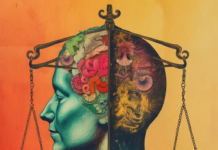For people living with mental health challenges, “recovery” can be a contested and highly personal process, not easily conceptualized through psychological or psychiatric concepts. A new meta-theoretical study by scholars Calvin Swords and Stan Houston from Trinity College Dublin examines how different understandings of recovery impact lived experience, mental health practice, and service delivery.
Swords and Houston explain:
“The aims of the research were to evaluate the extent to which a recovery approach informed practice … examine how the differing professionals … viewed the concept [of recovery]; and reach tentative conclusions on how to enhance the implementation of a recovery-oriented approach within practice.”
 In mental health discourse, recovery has been described as a ‘polyvalent’ concept and a ‘working misunderstanding.’ Prior studies have suggested that recovery is impacted by structural, cultural, and relational factors, with the impact of pharmaceutical treatment at best unclear.
In mental health discourse, recovery has been described as a ‘polyvalent’ concept and a ‘working misunderstanding.’ Prior studies have suggested that recovery is impacted by structural, cultural, and relational factors, with the impact of pharmaceutical treatment at best unclear.
Others have critiqued the notion of recovery itself as promoting a false dichotomy between wellness and illness, one that serves industry interests of cutting costs and depoliticizing the survivor movement. In other words, the celebration of recovery distracts from the many institutional and political factors that cause mental suffering, such as neoliberal capitalism, institutionalized racism, state violence, and poverty.
Still, others have pointed out that defining recovery as a return to a pre-crisis state may unreflectively endorse a mode of pre-crisis or “normal” functioning driven by dysfunctional coping mechanisms.
Before a turn away from purely biomedical conceptions of recovery in the late 20th and early 21st centuries, “if someone became acutely unwell, mentally speaking, the focus was solely on returning them to a biological state of perceived normality.” Abnormality in this context was defined by classificatory systems such as the DSM.
After many service users became frustrated with the limited conceptual resources of the biomedical model and the DSM, the authors explain:
“Personal recovery was introduced as a novel way of viewing mental illness. Its focus was on people’s personal narratives and how they recounted fulfilled lives irrespective of symptoms and medication. People should be at the forefront of defining what recovery meant to them, and living the best life they could aspire to, supported by the appropriate services.”
However, this view shifts the epistemic authority regarding recovery from the service to the service user. It has remained slow to supplant the biomedical model within mental health policy and has been inconsistently applied in many countries.
The idea that subjective experience is central to the idea of personal recovery is more fully explicable in terms of social constructionism. This view holds that “people’s understanding of reality is determined by their interactions with others” and takes a critical attitude towards claims of knowledge.
On this view, knowledge is not understood through scientific inquiry and experiments but through investigating dialogue, meaning, and human experience. Thus, any truths regarding personal recovery will be determined via individual, subjective experiences. Again, expertise or authority concerning recovery will inhere not in professional service providers but in the service users themselves.
With these theoretical underpinnings in mind, the researchers reviewed recovery literature to determine how these concepts were used in relation to the topic of recovery. A central theme they discovered was the attempt to conceptualize recovery in terms other than the biomedical paradigm.
Several studies viewed mental illness and recovery through a social constructivist lens. Others used narrative, phenomenology, or grounded theory to approach recovery. Many of the studies thus sought to include a lived experience perspective in conversations about the meaning of recovery.
However, throughout the literature, there remained a hesitancy to recognize a lived experience perspective as credible scientific evidence. As the authors conclude:
“without fully embracing the value of the lived experience perspective in research, there is a danger of viewing recovery in an ambivalent, detached, and objectivist way… [Embracing lived experience can] enhance empathy by tuning into a human narrative, by privileging the meaning-making activities that service users engage in when they seek to fashion their lives.”
Whether this remains a ‘working misunderstanding’ of the political causes of suffering through a false binary of recovery/illness is not addressed.
****
Swords, C., and Houston, S. (2021). “Using Social Constructionism to Research the Recovery Movement in Mental Health in Ireland: A Critical Reflection on Meta-Theory Shaping the Inquiry.” Irish Journal of Applied Social Sciences, ISSN 1393-7022, Vol. 21(1), 2021, 52-72. (Link)















MEDICAL DENIAL OF FULL RECOVERY – 30 YEARS AFTER FULL RECOVERY
From: ME
To: Medical Newton (NHS CENTRAL LONDON (WESTMINSTER) CCG)
Sent: Friday, 16 November 2018, 00:42:07 GMT
Subject: Att. All Partners and Dr Baluch
Dear Sirs/(Madams)
In your Letter dated October 17 2018 – you seriously misrepresent me.
TRUST
My trust in Newton Medical was broken in October of 2012 when (to my horror) I discovered my name had been on a Severe Mental Illness Register since 2002. At this time (2002) I had been working as a Building Subcontractor in the House of Parliament Buildings (and can substantiate this).
OCTOBER 8 2018 VISIT TO NEWTON MEDICAL. REGARDING HEALTH AND SAFETY ON BUILDING SITES
On October 8 2018 I explained (and showed ) to the Reception Manager and to Dr Baluch at Newton Medical, that at my last appointment on July 20 2016 Dr Simons had given me in writing a sheet of paper from the Appointment Notes stating that – “he could see no reason that I could NOT work on a Building Site” . While at the same time Dr Simons had provided me with another sheet of paper from a “Legal Adviser” (July 20 2016)
https://drive.google.com/file/d/1s-mEHH5pLC5EzWpxjnOLKcylQOTJ-Kvw/view?usp=drivesdk
(which made reference to the historical 1986 Irish Record Summary) but also at the the bottom of the page stated – that I had a “Diagnosis of Schizophrenia…” and “had NOT DISPUTED this diagnosis..”.
I explained on October 8 2018 that I had shown and discussed both of these contradictory statements received in July 20 2016 with a Building Health and Safety Officer who advised me to get this contradictory situation resolved – as the medical suggestions could undermine my credibility, and could affect me in the event of an accident on a Building Site.
I have not suffered any disability in my 30 years in the UK; but Medical Claims of Present day Severe Mental Illness are invalidating. I presumed Newton Medical (promoting the disability) to be the first place to approach – this is why I called to the Surgery on October 8 2018.
DISTRESS
When I clearly demonstrated the Malpractice properties of the 1986 Irish Record Summary to Dr Simons in two interviews in October/November 2012 – at the end of both of these interviews Dr Simons shirt was completely saturated and sticking to his body (he was genuinely traumatised).
But, there is no mention anywhere on my records of this Malpractice.
MY BACKGROUND
I made Full Recovery in 1984 as a Result of carefully tapering from the Modecate Depot Injection with the help of Practical Psychotherapy – and returned to normal life and independence.
Recovered 1
https://drive.google.com/file/d/1PW-wn9GOkiyWAbdzgXuC8cDS-7UPEj0-/view?usp=drivesdk
Recovered 2
https://drive.google.com/file/d/19xYpA4O4h9h45b_H2PtSBTNFx3ErE-MK/view?usp=drivesdk
Adverse Drug Reaction Warning Request Letter sent to Galway Nov. 8 1986
ADR Request ltr Pg 1
https://drive.google.com/file/d/0B0zhbh8V4MBAZlVTbHdBRDFFSHc/view?usp=drivesdk
ADR Request ltr Pg 2
https://drive.google.com/file/d/0B0zhbh8V4MBAZ0otNjFyN0NJajA/view?usp=drivesdk
ADR Request Ltr Pg 3
https://drive.google.com/file/d/0B0zhbh8V4MBAcExwMzhEMVRzdm8/view?usp=drivesdk
MALPRACTICE:
The Irish Record Summary dated November 24 1986 was Sent To UK In Response:- but WITHOUT Requested ADR WARNING
Irish Record Summary Pg 1
https://drive.google.com/file/d/0B0zhbh8V4MBATlNoNTlpYy11X28/view?usp=drivesdk
Irish Record Summary Pg 2
https://drive.google.com/file/d/0B0zhbh8V4MBAMmlqS18xQVZlcms/view?usp=drivesdk
Wellness Presentation at Galway in November 1980, according to Dr Fadel https://drive.google.com/file/d/0B0zhbh8V4MBANjBTZEtkbjBhMkU/view?usp=drivesdk
Dr Donlon Kenny False Reasurrance Letter November 1986
https://drive.google.com/file/d/0B0zhbh8V4MBAeUFLam5rYmtXd3c/view?usp=drivesdk
AKATHISIA.
Near Fatal Modecate Experience 1. https://drive.google.com/file/d/1EY4XDLt04KgmCjg_5wXU-kbVezo_DxL4/view?usp=drivesdk
Near Fatal Modecate Experience Pg 2
https://drive.google.com/file/d/1YTWxPJTtNeTDM9eewkHoSUJr0WpBpu4b/view?usp=drivesdk
Dr Allen Frances (DSM IV) 1983 https://www.researchgate.net/publication/16313058_Suicide_Associated_with_Akathisia_and_Depot_Fluphenazine_Treatment
https://rxisk.org/akathisia/
“…Significant symptoms of akathisia occur in:
around 20% of people on an antidepressant.
at least 50% of people on an antipsychotic. On higher doses, this rises to 80% or more..”
https://en.m.wikipedia.org/wiki/Akathisia
“..Around half of people on antipsychotics develop the condition…”
“…..Neuro-psychologist Dennis Staker had drug-induced akathisia for two days. His description of his experience was this:
“..It was the worst feeling I have ever had in my entire life. I wouldn’t wish it on my worst enemy…” ”
Drug induced Akathisia is medically acknowledged to cause suicide.
“Depot Antipsychotic Revisited Research Paper 1998” From Galway Psychiatrist Dr PA Carney.
https://ps.psychiatryonline.org/doi/10.1176/ps.49.10.1361-b.
About 4 out of 10 of the people on these drugs will attempt Suicide.
I notice that both Dr Simon Gordon and Dr Balucha are on the GP Commissioning Governing Board.
Yours Sincerely
ME
NOTE BENE
There is NO mention of Amsterdam on the UK side of my Mental Health Records.
Prior to returning to the UK at the end of the Summer of 1980, I had stayed for several months at this Address:-
Barndesteeg 21, 1012 BV Amsterdam, Netherlands
..where I had been socially acquainted with a Northern Irish Born Again Christian, who closely matches the description below..
https://en.m.wikipedia.org/wiki/Kevin_McGrady
..who had been concerned about a conversation we were supposed to have had, that I couldn’t place.
Report comment
My schizophrenia is a real actual illness that is mostly a kind of spiritual experience and is not caused by political factors. Nor trauma. I am an expert on me. Which is as it should be for everyone.
There are a great amount of political strifes currently that affect billions of poor, suffering people.
I think my schizophrenia is as politically caused as are period pains.
This is not to suggest that political injustice would not have a deliterious effect on my schizophrenia.
I am not going to lie to myself anymore. If economic inequality were a cause of absolutely everyone’s schizophrenia how come those wealthy people who are comfortable in their homes and who lack for nothing also get schizophrenia? The mad women in the attics of nineteenth century gothic novels were indeed housed in capacious roomy attics, they were not the rushing maids in the kitchen cellars who had no time to have the luxury of an emotional breakdown. The rich also get bipolar. Why is that? Why do rich girls in Swiss finishing schools who want for nothing shrivel up with anorexia? Why do millonaires who have it all drink themselves to a standstill? Why do seemingly happy and adored husbands who have built up a successful business suddenly go off the rails with cataclysmic depression? Even more bizarre, how come rich consultant psychiatrists are statistically more likely to suicide than many other less well heeled folks?
Doubtless an article will now dryly plop into my feed about how there is a massive link between schizophrenia and poverty. I am no fool to dispute that. If you are poor you will be susceptible to everything from the bubonic plague to the common cold. But poverty does not “cause” the common cold. Poverty is a weakener of many defenses against things that are “caused” by “other stuff”. But the poor do not have a monopoly on the “cause” of illness. Any more than the rich do. Illness is sometimes ruthlessly impartial that way. I cannot abide “us” and “them” thinking. Having been poor much of my life, I say “no”. My schizophrenia was and is “caused” by “other stuff”, whether that be mind glitches or brain disorder or preternatural hauntings or the wrong type of mushroom. My ordinary fed up distress is very likely to be poverty induced. Poverty and distress are virtually identical words. But not my schizophrenia illness. I have everything I need right now, yet my schizophrenia is still here. And just because I know this to be true does not mean I do not also see that the world is awash with manifold grotesque, gruelling, injustices. But in my view much of the injustice in the world is caused by “us” and “them” thinking, that thinks a poor person is valueless. But it is also an “us” and “them” thinking that claims that a terminally doomed cancer riddled rich child’s body is less ill than a healthy yet poor child’s body. Or a coughing emaciated poor child’s body is less ill than a healthy rich child’s body.
There is a way to pursue a path of justice that has no “them”. A way that brings everyone together, as Dr Martin Luther King juniour did. A way that ultimately aspires to the whole world becoming “us”.
But what do I know? I am just a crazy lady, quite driven mad by my intolerable schizophrenia. A schizophrenia that keeps making me halt in the middle of sentences because I don’t even know what I am saying. This comment had five more sentences I had to delete because my hallucination of a spectre told me to. And I am too afraid not to obey. To him I am always “them”.
Report comment
I think part of the problem is people confuse symptoms with root causes. I always focused on the trauma and subsequent dissociation that the trauma caused. IMO, these are the root causes of everything else. So much of the dsm is just symptomatic issues which spring from the original trauma and the mind’s subsequent coping mechanism of dissociation that then become systemic when the trauma isn’t dealt with.
However, there is one other issue I see when helping a survivor of early childhood trauma. S/he may have no baseline for ‘recovery.’ During a healthy childhood, the parents serve as role models for the child. But in a traumatic childhood that is often missing. When my wife and I first started our journey, over and over and over she told me, “I don’t know what ‘healthy’ looks like.” I took that as a cue for me to grow up and become a role model that my wife was lacking originally. I don’t dictate the outcome, but I try to model healthy behavior as we walk the journey together.
Sam
Report comment
I am deeply suspicious of the wholesale vogue for claiming that every mental illness is caused by trauma. I think many traumatized people really do go on to develop mental illness symptoms but if trauma alone accounted for all mental illness there would be so much mental illness the world would be peopled only by florid schizophrenics since EVERYONE has trauma. I have met lively happy traumatized people and bored to death untraumatized people. I have met people with disastrous childhoods who are so super healthy they wind up helping their whole neighbourhoods and I have met people with fabulous childhoods who just want to die. There are other reasons why I am none too keen on chalking up all mental illnesses as only arising from trauma. It gives those who perhaps have a dubious claim to having had a hard life, who declare themselves to be the traumatized, carte blanche for blaming whoever they thought “gave” them the trauma. As if tauma is a vial of novichok that the “them” have used to deliberately distress the “us”. It legitimates bullying and hate speech against the supposed traumatizers who may not even be personally known by the one who deems their natural every daily discontents are from trauma. And as for a paradigm of care that endorses only ever hunting for the trauma truffle, it could all creepily develop into a quasi-religious forced conversion where you have to “confess” your mom or pappy are in league with the Devil and did you harm. A confession that is the only way you will get granted enough victimhood cudos to permit your entry into into the cathedral of survivor saintliness. Where you will finally be treated like the “good person” you always were from the outset anyways.
A billion very sick psychotic people require support. Since in the West there is no such thing as community. All sorts of practical support is needed. If psychosis is going to be reduced to an outcrop of trauma, which is a sort of normal response to life events, all the governments tasked with funding that practical support will downgrade their having to do so. Then who do you think is going to feel traumatized for real?
Sam, I say this not to you personally or specifically. You are a great guy and you have found a viable treatment for those who have been traumatized. I champion the implimemting of as many treatment options as possible. By having a cluster of care paradigms no one paradigm gets to lord it over another and that will lead to a healthy world. I just took this moment to air these ponders.
Report comment
I am suspicious of the trope that any “mental illness” has a unitary cause at all. Trauma, nutrition, social conditions, sleep problems, immigration, urbanization, adverse drug events, grief and loss… there are many, many potential causes for any “mental illness” that exist and are routinely ignored.
Treating people as individuals and looking for root causes instead of categorizing and discriminating against people based on social constructs seems to me more likely to lead to better outcomes, regardless of what the DSM/psychiatry wants us to call these phenomena.
Report comment